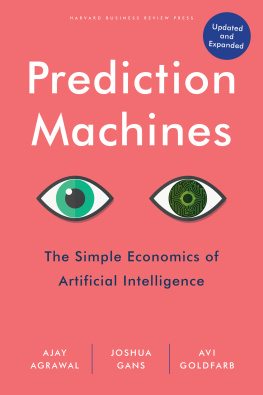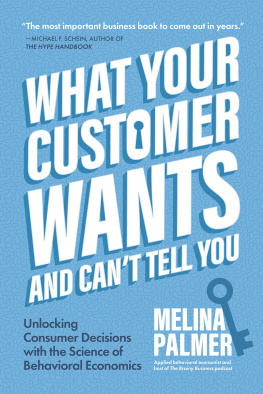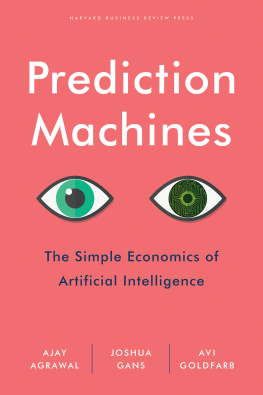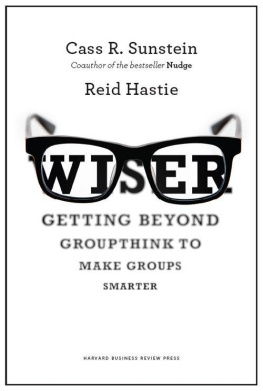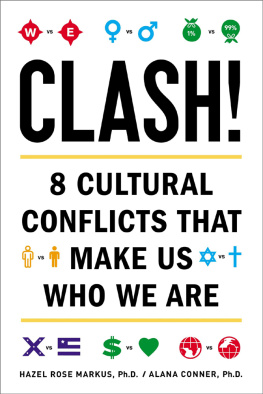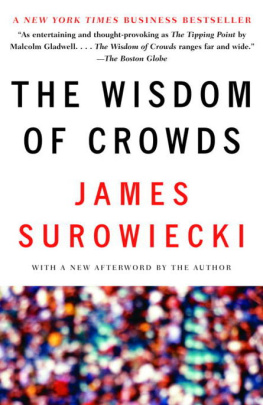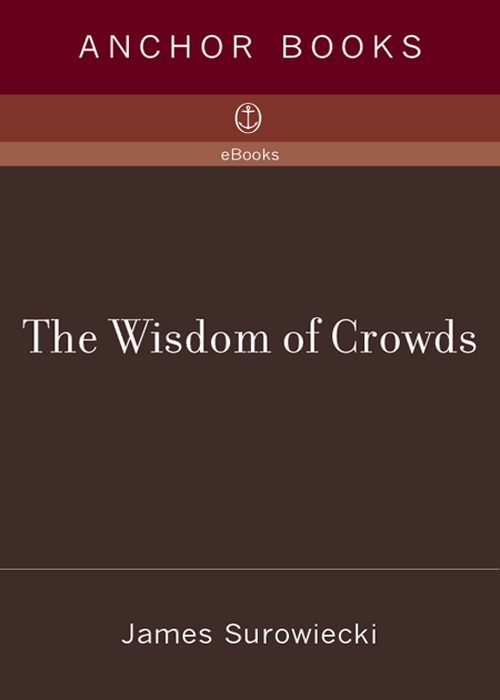
THE WISDOM
OF CROWDS
WHY THE MANY ARE SMARTER THAN THE FEW
AND HOW COLLECTIVE WISDOM SHAPES BUSINESS,
ECONOMIES, SOCIETIES, AND NATIONS
JAMES SUROWIECKI
DOUBLEDAY
New York London Toronto Sydney Auckland
CONTENTS
To Mom and Dad
INTRODUCTION
I
O ne day in the fall of 1906, the British scientist Francis Galton left his home in the town of Plymouth and headed for a country fair. Galton was eighty-five years old and beginning to feel his age, but he was still brimming with the curiosity that had won him renownand notorietyfor his work on statistics and the science of heredity. And on that particular day, what Galton was curious about was livestock.
Galtons destination was the annual West of England Fat Stock and Poultry Exhibition, a regional fair where the local farmers and townspeople gathered to appraise the quality of each others cattle, sheep, chickens, horses, and pigs. Wandering through rows of stalls examining workhorses and prize hogs may seem to have been a strange way for a scientist (especially an elderly one) to spend an afternoon, but there was a certain logic to it. Galton was a man obsessed with two things: the measurement of physical and mental qualities, and breeding. And what, after all, is a livestock show but a big showcase for the effects of good and bad breeding?
Breeding mattered to Galton because he believed that only a very few people had the characteristics necessary to keep societies healthy. He had devoted much of his career to measuring those characteristics, in fact, in order to prove that the vast majority of people did not have them. At the International Exhibition of 1884 in London, for instance, he set up an Anthropometric Laboratory, where he used devices of his own making to test exhibition-goers on, among other things, their Keenness of Sight and of Hearing, Colour Sense, Judgment of Eye, [and] Reaction Time. His experiments left him with little faith in the intelligence of the average person, the stupidity and wrong-headedness of many men and women being so great as to be scarcely credible. Only if power and control stayed in the hands of the select, well-bred few, Galton believed, could a society remain healthy and strong.
As he walked through the exhibition that day, Galton came across a weight-judging competition. A fat ox had been selected and placed on display, and members of a gathering crowd were lining up to place wagers on the weight of the ox. (Or rather, they were placing wagers on what the weight of the ox would be after it had been slaughtered and dressed.) For sixpence, you could buy a stamped and numbered ticket, where you filled in your name, your address, and your estimate. The best guesses would receive prizes.
Eight hundred people tried their luck. They were a diverse lot. Many of them were butchers and farmers, who were presumably expert at judging the weight of livestock, but there were also quite a few people who had, as it were, no insider knowledge of cattle. Many non-experts competed, Galton wrote later in the scientific journal Nature, like those clerks and others who have no expert knowledge of horses, but who bet on races, guided by newspapers, friends, and their own fancies. The analogy to a democracy, in which people of radically different abilities and interests each get one vote, had suggested itself to Galton immediately. The average competitor was probably as well fitted for making a just estimate of the dressed weight of the ox, as an average voter is of judging the merits of most political issues on which he votes, he wrote.
Galton was interested in figuring out what the average voter was capable of because he wanted to prove that the average voter was capable of very little. So he turned the competition into an impromptu experiment. When the contest was over and the prizes had been awarded, Galton borrowed the tickets from the organizers and ran a series of statistical tests on them. Galton arranged the guesses (which totaled 787 in all, after he had to discard thirteen because they were illegible) in order from highest to lowest and graphed them to see if they would form a bell curve. Then, among other things, he added all the contestants estimates, and calculated the mean of the groups guesses. That number represented, you could say, the collective wisdom of the Plymouth crowd. If the crowd were a single person, that was how much it would have guessed the ox weighed.
Galton undoubtedly thought that the average guess of the group would be way off the mark. After all, mix a few very smart people with some mediocre people and a lot of dumb people, and it seems likely youd end up with a dumb answer. But Galton was wrong. The crowd had guessed that the ox, after it had been slaughtered and dressed, would weigh 1,197 pounds. After it had been slaughtered and dressed, the ox weighed 1,198 pounds. In other words, the crowds judgment was essentially perfect. Perhaps breeding did not mean so much after all. Galton wrote later: The result seems more creditable to the trustworthiness of a democratic judgment than might have been expected. That was, to say the least, an understatement.
II
What Francis Galton stumbled on that day in Plymouth was the simple, but powerful, truth that is at the heart of this book: under the right circumstances, groups are remarkably intelligent, and are often smarter than the smartest people in them. Groups do not need to be dominated by exceptionally intelligent people in order to be smart. Even if most of the people within a group are not especially well-informed or rational, it can still reach a collectively wise decision. This is a good thing, since human beings are not perfectly designed decision makers. Instead, we are what the economist Herbert Simon called boundedly rational. We generally have less information than wed like. We have limited foresight into the future. Most of us lack the abilityand the desireto make sophisticated cost-benefit calculations. Instead of insisting on finding the best possible decision, we will often accept one that seems good enough. And we often let emotion affect our judgment. Yet despite all these limitations, when our imperfect judgments are aggregated in the right way, our collective intelligence is often excellent.
This intelligence, or what Ill call the wisdom of crowds, is at work in the world in many different guises. Its the reason the Internet search engine Google can scan a billion Web pages and find the one page that has the exact piece of information you were looking for. Its the reason its so hard to make money betting on NFL games, and it helps explain why, for the past fifteen years, a few hundred amateur traders in the middle of Iowa have done a better job of predicting election results than Gallup polls have. The wisdom of crowds has something to tell us about why the stock market works (and about why, every so often, it stops working). The idea of collective intelligence helps explain why, when you go to the convenience store in search of milk at two in the morning, there is a carton of milk waiting there for you, and it even tells us something important about why people pay their taxes and help coach Little League. Its essential to good science. And it has the potential to make a profound difference in the way companies do business.
In one sense, this book tries to describe the world as it is, looking at things that at first glance may not seem similar but that are ultimately very much alike. But this book is also about the world as it might be. One of the striking things about the wisdom of crowds is that even though its effects are all around us, its easy to miss, and, even when its seen, it can be hard to accept. Most of us, whether as voters or investors or consumers or managers, believe that valuable knowledge is concentrated in a very few hands (or, rather, in a very few heads). We assume that the key to solving problems or making good decisions is finding that one right person who will have the answer. Even when we see a large crowd of people, many of them not especially well-informed, do something amazing like, say, predict the outcomes of horse races, we are more likely to attribute that success to a few smart people in the crowd than to the crowd itself. As sociologists Jack B. Soll and Richard Larrick put it, we feel the need to chase the expert. The argument of this book is that chasing the expert is a mistake, and a costly one at that. We should stop hunting and ask the crowd (which, of course, includes the geniuses as well as everyone else) instead. Chances are, it knows.
Next page

